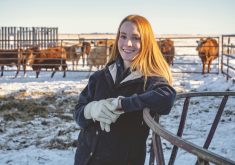It begins with a little girl, her face splattered with freckles, ambling up a dirt lane on a Georgia farm where her ancestors first broke ground. On either side, rows and rows of peanuts defiantly poked through the sand to thrive under the southern sun.
Inside the clapboard farmhouse at the end of the lane, adult voices rumbled and shrilled against each other, talking of debt and 18 per cent interest rates (it was the mid-’80s).
The little girl listened until her parents, seeing their daughter, softened their tones, but talked still about the implications of the last season when a hurricane had settled in the Gulf and spewed 22 days of rain during harvest, rotting their crop and sprouting grey hair all over her mama’s head.
Read Also

Riding the tariff rollercoaster
Farmers are accustomed to roller-coaster years. But the current geopolitical windstorm is something else entirely. On his cattle operation near…
Then her parents turned to her. She could do anything, they said. But not agriculture.
And she did as they said, growing up to study journalism and then securing a job as press secretary for a member of the U.S. Congress. Like her parents, she dug in and worked hard.
A few years later, with a wry twist of fate, that member of Congress assigned her to work on the Farm Bill, Washington’s blueprint for the farm sector.
Which is how Krysta Harden returned to agriculture, spending over a decade working on agriculture policy on Capitol Hill. She then went on to become U.S. ag secretary Tom Vilsack’s chief of staff and then USDA deputy secretary, the second-highest-ranking official in the United States Department of Agriculture, appointed by the President with the consent of the Senate.
In that role she not only led the 2014 Farm Bill but made key inroads into giving women in agriculture a voice, for instance by founding the department’s Women in Agriculture Mentoring Network (www.usda.gov/our-agency/initiatives/women-agriculture), which now has more than 1,000 members.
Behind the scenes, Harden pushed to allow more than one primary producer to be enumerated per farm, so spouses could be counted as farmers on the federal census, which has been done in Canada since 1991.
“We shouldn’t underestimate the importance of data,” Harden says. “Shame on us (women), if we don’t want to be counted.”
Today, women make up about half of the agricultural labour force worldwide and are over 60 per cent of graduates from U.S. agricultural schools. Yet those women own and operate a disproportionately small number of farms, says Harden.
“Women contributing to farming, to agriculture, isn’t new. It’s how we value their contribution that’s new,” she says. “They have as much to lose as their partners. They’re COOs and CFOs of farm businesses, and yet we call them a ‘Farm Wife’?”

Harden has also worked for lobby groups, notably as CEO of a national resource conservation association and the American Soybean Association. Last year she took a turn toward private business, and is now vice-president of public policy and chief sustainability officer with DuPont.
Although she has been given many opportunities in this industry, she has only worked for men and has found over the years that her male colleagues were always raised to be respectful, but she has run into some very different standards for women. She says businesses benefit from more diversity, both gender and cultural. “There may be some obstacles but there are lots of opportunities,” she says.
The excuse that’s often given for not having women on boards is that traditionally the boards need the “best” people. Harden agrees, but in her career has found that the way “best” is defined is often very subjective and tends to be not varied enough.
She finds that having a variety of backgrounds and skills helps with decision-making, resulting in more creative solutions and different perspectives.
But Harden says having a woman on a board needs to involve more than a token position, because no one listens to tokens. In fact, she’s found it takes at least three women to actually make an impact on a board. “Three echoes are needed for their opinions to be heard,” she says.
It’s not only about being heard but it’s about encouraging engagement from all parties.
For example, even if Harden doesn’t agree with one of the women at a meeting, she’ll ask more questions and give that woman more of a voice. She feels it teaches the woman how to influence through discussion and teaches the men that they need to engage with the women on the board.
Harden strongly feels that women have to help women. When she gets asked for recommendations, she deliberately only suggests women, explaining that there are lots of male recommendations already.
She tries to empower other women and encourage them to take leadership roles, even though it might come at a cost. When Harden spoke at the Advancing Women’s Conference in Calgary in March, she said that she might get fired for speaking publicly about women’s equality issues. “A decade ago we wouldn’t be having this meeting (ag women only),” she says. “I was always a party of one.”
She encouraged the 460 women in attendance to network and actively help each other. And she has found that networking between women in a male-dominated industry is very important to personal growth.
At the conference, she also talked about how she voluntarily covered maternity leaves for other women, and how society needs to better support both men and women in their parenting.
She also answered politically positively when asked if she supports mandating diversity on boards. “How do we make people do the right thing?” she asked.
That includes doing the right thing internationally. Through her government work and now heading up corporate responsibility work for DuPont, Harden has travelled throughout the developing world talking about agriculture. She says women will be key in making the future of farming sustainable, especially in developing countries.
According to the USDA, in developing countries, women make up about half of the agricultural labour force and they’re more likely to invest income to improve education, nutrition and health for their families. This group estimates if these women farmers had the same access to productive resources as men, they could increase their farm yields by 20 to 30 per cent, feeding an additional 150 million people.
Sometimes cultural traditions and legislation are biased against women in an already tough environment — from it not being acceptable for women to market their own production, to not being allowed to acquire good-quality seeds and tools, to not having the basic right to own land or have a land tenure. This gender inequity is contributing to the growing divide in income levels in Africa.
Harden doesn’t hold back tears when she talks about meeting with women in western Africa through her work with the Cocoa Foundation. “They had a great fear; if their husbands got sick or died, they’d lose their land and the ability to grow food for their children. They’d lose their home, and they’d lose their security,” she says. “I can’t imagine my sister losing my family’s land to a tribal chief because her husband died.”
Furthermore, she says many of the farmers are very geographically isolated, and the poor transportation infrastructure limits their potential. Even extension information is difficult in these situations and needs to be delivered verbally to both men and women.
She explains that DuPont has three sustainability focuses: women, youth/children and water. They try to partner with local government and established ethical well-run NGOs. For example, DuPont supports female ag scientists in Africa working on research to improve food security and reduce poverty, and DuPont/Pioneer is a big supporter of the burgeoning 4-H program in Africa. DuPont spends over US$17 million a year on philanthropy, with additional philanthropic spending by some of our global business units, regions or sites.
Harden says more female voices are needed in the entire industry, both as decision-makers and as messengers. Women still do most of the shopping and the meal planning. And in her experience, many of the men on boards cannot relate to the people making food decisions. “Women need to add their chair to the table,” she says.
Furthermore, she says women are natural networkers, sharing food information and advice with other women, their family, friends and co-workers.
And, she says, North American women need to be messengers for agriculture and for food, because other women trust them.















